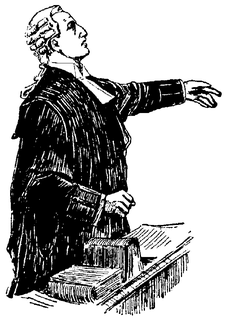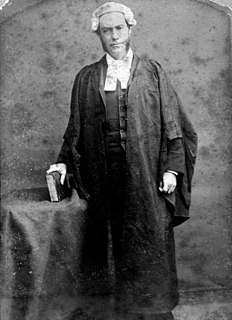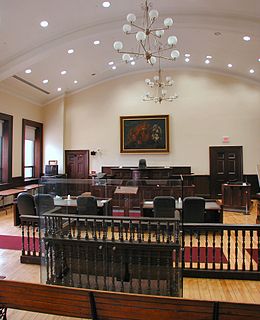
A barrister is a type of lawyer in common law jurisdictions. Barristers mostly specialise in courtroom advocacy and litigation. Their tasks include taking cases in superior courts and tribunals, drafting legal pleadings, researching the philosophy, hypothesis and history of law, and giving expert legal opinions.

An advocate is a professional in the field of law. Different countries' legal systems use the term with somewhat differing meanings. The broad equivalent in many English law–based jurisdictions could be a barrister or a solicitor. However, in Scottish, Manx Law, South African, Italian, French, Spanish, Portuguese, Scandinavian, Polish, Israeli, South Asian and South American jurisdictions, "Advocate" indicates a lawyer of superior classification.
A solicitor is a legal practitioner who traditionally deals with most of the legal matters in some jurisdictions. A person must have legally-defined qualifications, which vary from one jurisdiction to another, to be described as a solicitor and enabled to practise there as such. For example, in England and Wales a solicitor is admitted to practise under the provisions of the Solicitors Act 1974. With some exceptions, practising solicitors must possess a practising certificate. There are many more solicitors than barristers in England; they undertake the general aspects of giving legal advice and conducting legal proceedings.

In the United Kingdom and in some Commonwealth countries, a Queen's Counsel during the reign of a queen, or King's Counsel during the reign of a king, is a lawyer who is a senior counsel in court cases; in important cases each side is typically led by one. Technically, they are appointed by the monarch of the country to be one of 'Her [His] Majesty's Counsel learned in the law'. The position originated in England. Some Commonwealth countries have either abolished the position, or renamed it so as to remove monarchical connotations, for example, 'Senior Counsel' or 'Senior Advocate'.
A bar association is a professional association of lawyers as generally organized in countries following the Anglo-American types of jurisprudence. The word bar is derived from the old English/European custom of using a physical railing to separate the area in which court business is done from the viewing area for the general public.
The call to the bar is a legal term of art in most common law jurisdictions where persons must be qualified to be allowed to argue in court on behalf of another party and are then said to have been "called to the bar" or to have received a "call to the bar." "The bar" is now used as a collective noun for barristers, but literally referred to the wooden barrier in old courtrooms, which separated the often crowded public area at the rear from the space near the judges reserved for those having business with the Court. Barristers would sit or stand immediately behind it, facing the judge, and could use it as a table for their briefs.

In law, the bar is the legal profession as an institution. The term is a metonym for the line that separates the parts of a courtroom reserved for spectators and those reserved for participants in a trial such as lawyers.

Court dress comprises the style of clothes and other attire prescribed for members of courts of law. Depending on the country and jurisdiction's traditions, members of the court may wear formal robes, gowns, collars, or wigs. Even within a certain country and court setting, there may be times when the full formal dress is not used, such as in trials involving children.

The Crown Court of England and Wales is, together with the High Court of Justice and the Court of Appeal, one of the constituent parts of the Senior Courts of England and Wales. It is the highest court of first instance in criminal cases; however, for some purposes the Crown Court is hierarchically subordinate to the High Court and its Divisional Courts.
A bar examination is an examination administered by the bar association of a jurisdiction that a lawyer must pass in order to be admitted to the bar of that jurisdiction.

A courtroom is the enclosed space in which courts of law are held in front of a judge. A number of courtrooms, which may also be known as "courts", may be housed in a courthouse. In recent years, courtrooms have been equipped with audiovisual technology to permit everyone present to clearly hear testimony and see exhibits.

Barristers in England and Wales are one of the two main categories of lawyer in England and Wales, the other being solicitors. Barristers have traditionally had the role of handling cases for representation in court, both defence and prosecution.
Legal education in the United Kingdom is divided between the common law system of England and Wales and Northern Ireland, and that of Scotland, which uses a hybrid of common law and civil law.
An admission to practice law is acquired when a lawyer receives a license to practice law. In jurisdictions with two types of lawyer, as with barristers and solicitors, barristers must gain admission to the bar whereas for solicitors there are distinct practising certificates.

Solicitor advocate is a hybrid status which is named to represent clients in higher courts.

A bencher or Master of the Bench is a senior member of an Inn of Court in England and Wales or the Inns of Court in Northern Ireland, or the Honorable Society of King's Inns in Ireland. Benchers hold office for life once elected. A bencher can be elected while still a barrister, in recognition of the contribution that the barrister has made to the life of the Inn or to the law. Others become benchers as a matter of course when appointed as a High Court judge. The Inn may elect non-members as honorary benchers – for example, distinguished judges and lawyers from other countries, eminent non-lawyers or members of the British Royal Family, who become known as "Royal Benchers" once elected.

A box pew is a type of church pew that is encased in panelling and was prevalent in England and other Protestant countries from the 16th to early 19th centuries.
Frederick Garling was an English attorney and solicitor, and was one of the first solicitors admitted in Australia and was regarded as the first senior solicitor of the second Supreme Court established in the colony of New South Wales. Garling is recognised as being one of the first Crown Solicitors in Australia.

Bench used in a legal context can have several meanings. First, it can simply indicate the location in a courtroom where a judge sits. Second, the term bench is a metonym used to describe members of the judiciary collectively, or the judges of a particular court, such as the Queen's Bench or the Common Bench in England and Wales, or the federal bench in the United States. Third, the term is used to differentiate judges, who are referred to as "the bench", from attorneys or barristers, who are referred to as "the bar". The phrase "bench and bar" denotes all judges and lawyers collectively. The term "full bench" is used when all the judges of a certain court sit together to decide a case, as in the phrase "before the full bench", which is also referred to as "en banc".









